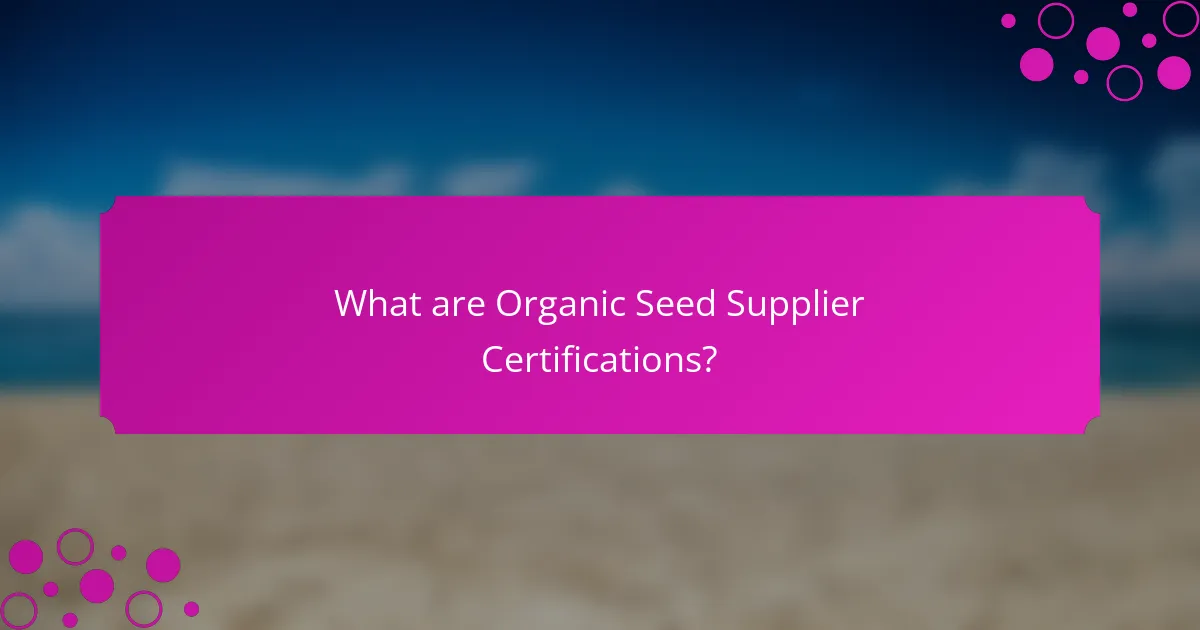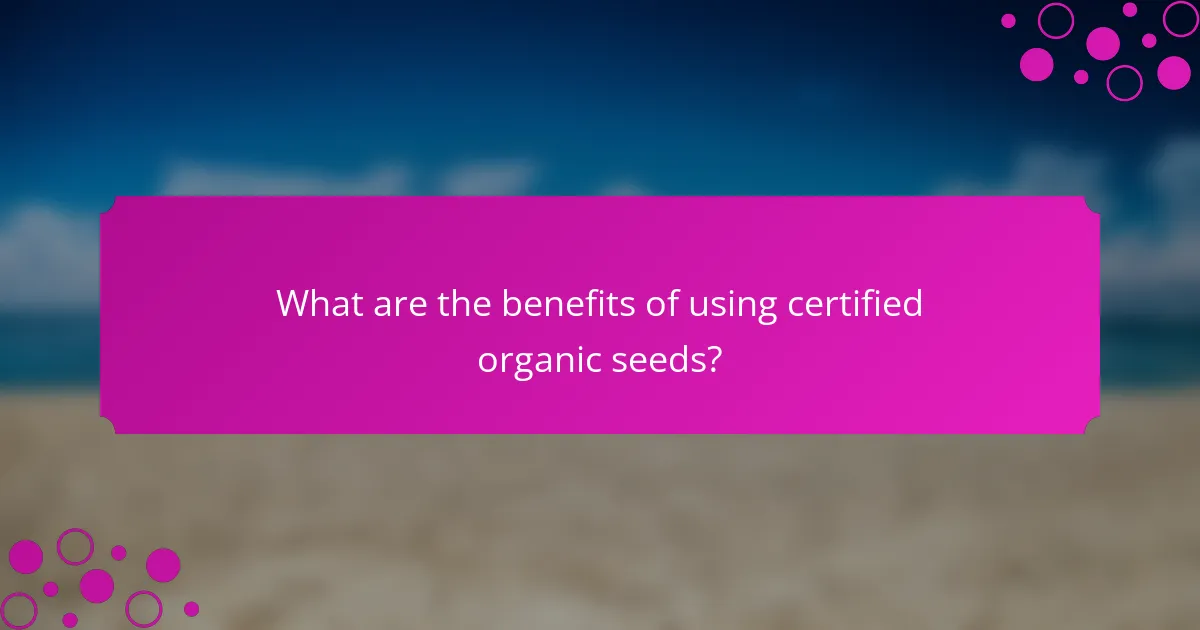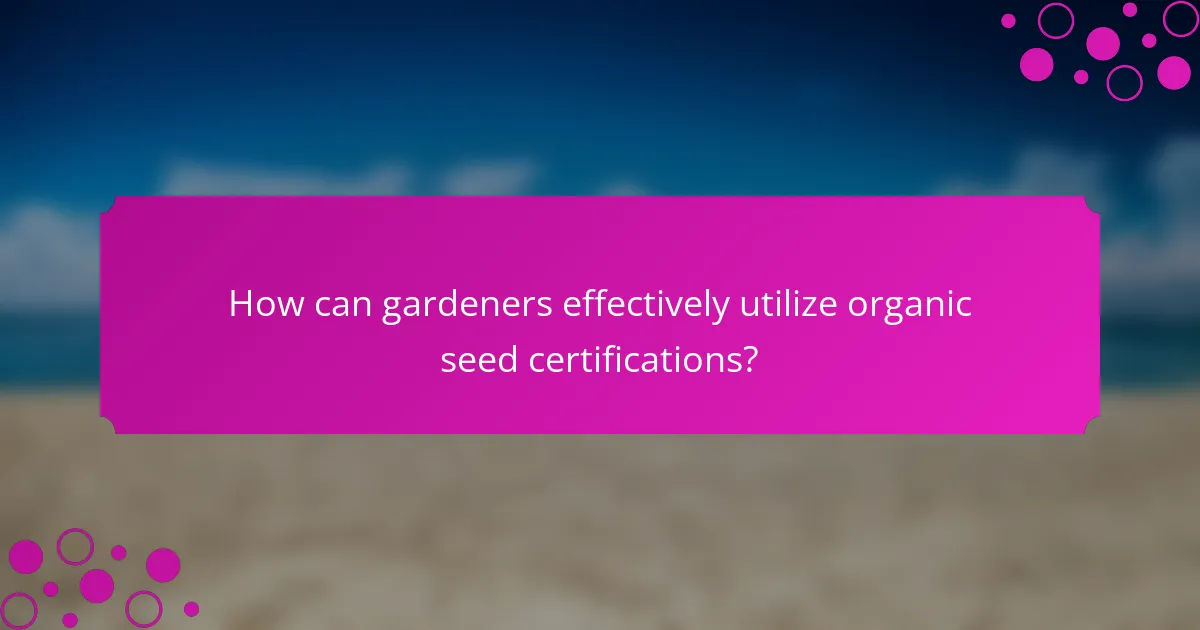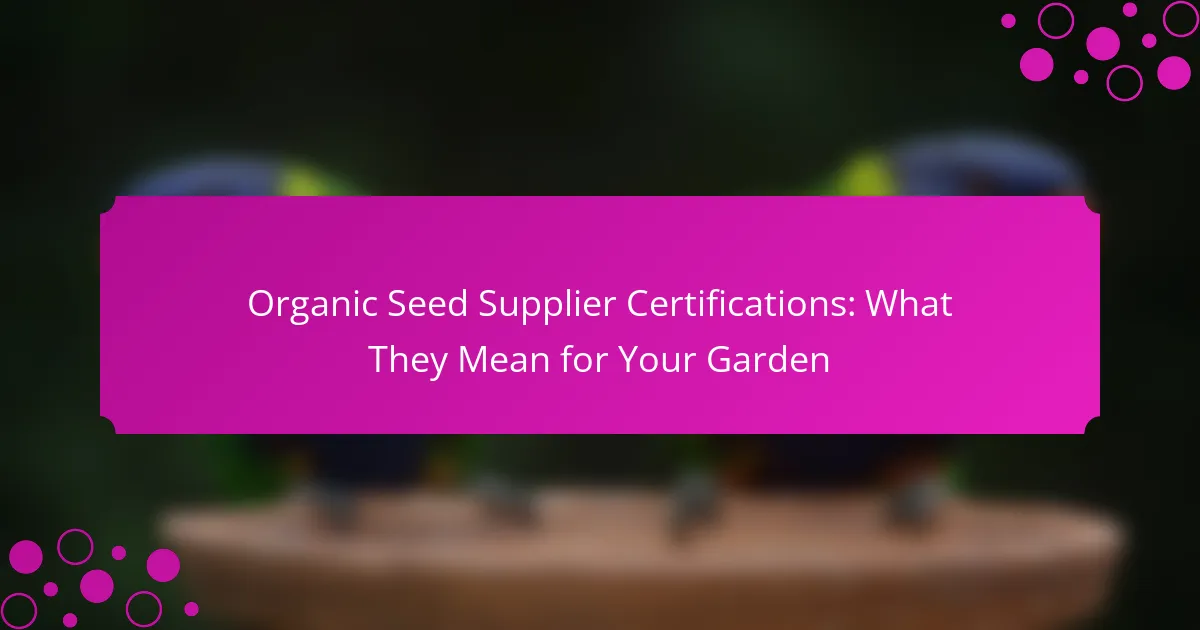Organic Seed Supplier Certifications are essential recognitions that confirm seeds are produced in accordance with organic farming standards, ensuring they are free from synthetic fertilizers, pesticides, and genetically modified organisms (GMOs). These certifications are granted by accredited organizations and adhere to strict guidelines established by regulatory bodies like the USDA. The article explores the significance of certified organic seeds, emphasizing their role in promoting sustainable agriculture, enhancing biodiversity, and improving soil health. It also highlights how these seeds contribute to the nutritional value of crops and support local organic farmers. Gardeners are guided on how to select certified organic seeds to align with organic gardening principles and practices.

What are Organic Seed Supplier Certifications?
Organic Seed Supplier Certifications are official recognitions that ensure seeds are produced according to organic farming standards. These certifications verify that seeds are grown without synthetic fertilizers, pesticides, or genetically modified organisms (GMOs). They are issued by accredited organizations that follow strict guidelines set by regulatory bodies, such as the USDA in the United States. Certified organic seeds must come from plants that have been grown in organic soil and managed according to organic practices for a specified period. This certification helps consumers identify seeds that align with organic gardening principles. Additionally, it promotes biodiversity and sustainable agricultural practices. Overall, organic seed certifications provide assurance of quality and integrity for gardeners seeking to cultivate organic crops.
Why are Organic Seed Supplier Certifications important for gardeners?
Organic Seed Supplier Certifications are important for gardeners because they ensure the seeds meet specific organic standards. These certifications indicate that the seeds are grown without synthetic pesticides or fertilizers. Certified seeds promote healthier soil and ecosystems. They also help prevent the contamination of organic crops. Furthermore, using certified seeds supports sustainable farming practices. Studies show that organic farming can enhance biodiversity and improve soil health. By choosing certified seeds, gardeners contribute to a more sustainable agricultural system. This choice also aligns with consumer demand for organic produce.
What criteria must suppliers meet to obtain organic certifications?
Suppliers must meet specific criteria to obtain organic certifications. They must adhere to the National Organic Program (NOP) standards set by the USDA. This includes using organic seeds and planting stock. Suppliers must also demonstrate that their farming practices avoid synthetic fertilizers and pesticides. They need to maintain soil health through organic methods, such as crop rotation and composting. Record-keeping is essential for traceability and compliance verification. Regular inspections by accredited certifying agents are required to ensure ongoing adherence to organic standards. These criteria ensure the integrity of organic products in the market.
How do these certifications impact seed quality and safety?
Certifications significantly enhance seed quality and safety. They ensure that seeds meet specific agricultural standards. These standards often include testing for purity and germination rates. Certified seeds are less likely to carry diseases or pests. This reduces the risk of crop failure for farmers. Additionally, certifications often require adherence to sustainable practices. This promotes environmental health and biodiversity. Research shows that certified organic seeds can produce higher yields. Studies indicate that certified seeds lead to healthier plants overall.
What types of organic certifications exist for seed suppliers?
There are several types of organic certifications for seed suppliers. The most recognized certification is the USDA Organic certification. This certification ensures that seeds are grown without synthetic fertilizers or pesticides. Another certification is the Oregon Tilth certification, which focuses on sustainable agricultural practices. The Non-GMO Project Verified certification is also significant. This certification assures consumers that seeds are free from genetically modified organisms. Additionally, some suppliers may hold certifications from local or regional organic certifying bodies. These certifications may vary in their specific requirements but generally adhere to organic farming standards.
How do USDA certifications differ from other organic certifications?
USDA certifications are specific to the United States and adhere to federal regulations. Other organic certifications may vary by country or organization, leading to different standards. USDA certifications require compliance with the National Organic Program (NOP) standards. These standards include guidelines on soil health, pest management, and synthetic substances. In contrast, other certifications might have additional or alternative requirements. For example, the European Union’s organic certification has distinct regulations compared to USDA. USDA-certified products must be inspected annually to maintain their status. This inspection process may differ in frequency and criteria for other organic certifications.
What role do third-party certifiers play in the certification process?
Third-party certifiers are independent organizations that verify compliance with specific standards in the certification process. They assess organic seed suppliers to ensure adherence to organic farming practices. This includes evaluating production methods, handling, and labeling. Their role enhances credibility and trust in organic certifications. Third-party certifiers conduct on-site inspections and review documentation. They ensure that suppliers meet regulatory requirements set by authorities like the USDA. This independent verification helps maintain the integrity of organic labeling. Ultimately, third-party certifiers provide assurance to consumers about the authenticity of organic products.
How can gardeners identify certified organic seed suppliers?
Gardeners can identify certified organic seed suppliers by checking for USDA organic certification. This certification ensures that seeds meet strict organic farming standards. Suppliers must provide documentation proving their organic status. Additionally, gardeners can look for labels that state “certified organic” on seed packets. Researching suppliers through trusted organizations like the Organic Seed Alliance can also help. These resources maintain lists of certified suppliers. Finally, visiting local farmers’ markets can connect gardeners with organic seed vendors.
What labels or symbols should gardeners look for on seed packaging?
Gardeners should look for labels such as “Certified Organic” and “Non-GMO” on seed packaging. These labels indicate that the seeds meet specific agricultural standards. “Certified Organic” ensures that seeds are produced without synthetic fertilizers or pesticides. “Non-GMO” signifies that the seeds do not contain genetically modified organisms. Additionally, symbols like the USDA Organic seal can provide further assurance of organic practices. These certifications help gardeners select seeds that align with sustainable gardening practices.
How can online resources help in finding certified suppliers?
Online resources can significantly aid in finding certified suppliers. They provide access to databases that list certified organic seed suppliers. Websites like the USDA Organic Integrity Database allow users to verify certifications. Online directories can also categorize suppliers by location and product type. User reviews and ratings on platforms can help assess supplier reliability. Social media groups often share recommendations for certified suppliers. Additionally, industry-specific forums may offer insights and connections to reputable suppliers. These resources streamline the search process and ensure compliance with organic standards.

What are the benefits of using certified organic seeds?
Certified organic seeds promote sustainable agriculture and enhance biodiversity. They are grown without synthetic pesticides or fertilizers. This results in healthier soil and ecosystems. Studies show that organic farming can improve soil quality over time. Certified organic seeds often yield crops that are more resilient to pests and diseases. They also contribute to the reduction of chemical runoff into waterways. Furthermore, using these seeds supports local organic farmers and the economy. Research indicates that organic produce can have higher nutritional value.
How do certified organic seeds contribute to sustainable gardening?
Certified organic seeds contribute to sustainable gardening by promoting biodiversity and reducing chemical use. They are grown without synthetic fertilizers or pesticides. This practice supports soil health and ecosystem balance. Research shows that organic farming enhances soil structure and fertility. Organic seeds also encourage local food systems by supporting small-scale farmers. These seeds often lead to healthier plants that are more resilient to pests. Studies indicate that organic crops can yield comparable harvests to conventional methods. Overall, certified organic seeds play a crucial role in sustainable agricultural practices.
What environmental advantages do organic seeds offer?
Organic seeds promote biodiversity and reduce chemical use in agriculture. They support healthier ecosystems by encouraging natural pest control. Organic seeds are grown without synthetic pesticides or fertilizers. This practice improves soil health and reduces water contamination. Research shows that organic farming can enhance soil organic matter by 22% over conventional methods. Organic seeds also contribute to the conservation of heirloom varieties. These varieties often have unique traits that can withstand climate change. Overall, organic seeds play a crucial role in sustainable agriculture.
How do organic seeds enhance biodiversity in gardens?
Organic seeds enhance biodiversity in gardens by promoting a diverse range of plant species. These seeds are often heirloom varieties, which are less likely to be genetically modified. This genetic diversity allows for a wider array of plants that can attract various pollinators and beneficial insects. Increased plant variety supports different wildlife, creating a more balanced ecosystem. Organic seeds also encourage the growth of native plants, which are better adapted to local conditions. Studies show that diverse plant life can improve soil health and resilience against pests. Overall, using organic seeds fosters a richer, more sustainable garden environment.
What health benefits are associated with using organic seeds?
Organic seeds provide several health benefits. They are free from synthetic pesticides and fertilizers. This reduces exposure to harmful chemicals. Organic seeds contribute to better soil health, promoting nutrient-rich plants. Nutrient-dense crops can enhance overall dietary quality. Studies show that organic produce often has higher antioxidant levels. Antioxidants are linked to reduced risks of chronic diseases. Additionally, organic farming practices support biodiversity. This ecological balance can lead to healthier ecosystems.
How do organic seeds impact the nutritional value of crops?
Organic seeds can enhance the nutritional value of crops. Research indicates that crops grown from organic seeds often contain higher levels of vitamins and minerals. A study published in the journal “Food Chemistry” found that organic produce typically has increased antioxidant content. Antioxidants are beneficial for health and can reduce the risk of chronic diseases. Additionally, organic farming practices improve soil health, which can lead to more nutrient-dense crops. The USDA Organic certification ensures that seeds are free from synthetic fertilizers and pesticides, promoting healthier plant growth. Thus, using organic seeds contributes positively to the nutritional profile of the resulting crops.
What are the potential health risks of using non-organic seeds?
Using non-organic seeds can pose several health risks. Non-organic seeds may be treated with synthetic pesticides and herbicides. These chemicals can remain on the seeds and potentially enter the food supply. Research indicates that some pesticides are linked to health issues such as cancer and neurological disorders. Additionally, non-organic seeds may lack the genetic diversity found in organic varieties. This can lead to a higher susceptibility to pests and diseases. Furthermore, consuming produce grown from non-organic seeds may expose individuals to harmful chemicals. Studies show that organic farming reduces chemical exposure and promotes healthier soil. Therefore, opting for organic seeds can mitigate these health risks.
What challenges might gardeners face when sourcing organic seeds?
Gardeners may face several challenges when sourcing organic seeds. Limited availability can be a significant issue, as not all suppliers offer a wide range of organic options. Additionally, inconsistencies in seed quality can arise, leading to poor germination rates or unhealthy plants.
Another challenge is the potential for higher costs associated with organic seeds compared to conventional seeds. Gardeners may also encounter difficulties in verifying the authenticity of organic certifications from suppliers. This can lead to uncertainty about whether the seeds meet organic standards.
Furthermore, regional restrictions can limit access to certain organic seed varieties. Seasonal demand fluctuations may also affect the availability of desired seeds. Lastly, lack of information about specific organic seed varieties can hinder gardeners’ ability to make informed choices.
How can seasonal availability affect the purchase of organic seeds?
Seasonal availability significantly influences the purchase of organic seeds. Different crops have specific growing seasons, which dictate when seeds are available for sale. For instance, spring is prime time for planting many vegetables, leading to higher demand for organic seeds during this period. Conversely, seeds for fall crops may be less sought after as the season changes. Limited availability can result in higher prices or fewer options for consumers. Additionally, suppliers may stock seeds based on anticipated seasonal demand, affecting the variety offered at any given time. Understanding these seasonal patterns helps gardeners plan their purchases effectively.
What are common misconceptions about organic seed certifications?
Common misconceptions about organic seed certifications include the belief that all organic seeds are genetically modified. In reality, organic seeds must come from non-GMO sources. Another misconception is that organic certification guarantees higher yields. Studies show that yield can vary based on many factors, not just certification. Some people think that all organic seeds are free from pesticides. However, organic farming allows the use of certain natural pesticides. Additionally, there is a belief that organic seeds are always more expensive. While prices can be higher, many factors influence seed costs. Lastly, some assume that organic certification is a simple process. In fact, it requires rigorous standards and inspections to maintain certification.

How can gardeners effectively utilize organic seed certifications?
Gardeners can effectively utilize organic seed certifications by selecting seeds that meet strict organic standards. These certifications ensure that seeds are grown without synthetic pesticides or fertilizers. Gardeners should look for labels from recognized certifying bodies, such as the USDA Organic seal. This label guarantees that the seeds have been produced in compliance with organic farming practices. Additionally, gardeners can use certified organic seeds to improve soil health and biodiversity in their gardens. Research indicates that using organic seeds can lead to better crop resilience and higher nutritional value. By choosing certified seeds, gardeners contribute to sustainable agriculture and support organic farming initiatives.
What best practices should gardeners follow when selecting organic seeds?
Gardeners should choose organic seeds that are certified by a reputable organization. Certification ensures that seeds meet specific organic standards. Look for labels from organizations like the USDA or Oregon Tilth. Check the seed packet for details on the seed’s origin and growing practices. Select seeds that are adapted to your local climate and soil conditions. This increases the likelihood of successful growth. Consider the seed variety’s disease resistance and yield potential. Research the supplier’s reputation and customer reviews for reliability. Choosing high-quality organic seeds supports sustainable gardening practices.
How can gardeners ensure they are purchasing from reputable suppliers?
Gardeners can ensure they are purchasing from reputable suppliers by verifying certifications. Look for organic certifications from recognized organizations. These certifications indicate adherence to specific agricultural standards. Research the supplier’s history and customer reviews. Reliable suppliers typically have positive feedback from previous customers. Additionally, check if the supplier provides transparency about their sourcing practices. This includes information on seed origins and growing methods. Engaging with suppliers directly can also help assess their knowledge and commitment to quality.
What strategies can enhance the success of growing certified organic seeds?
Utilizing crop rotation enhances the success of growing certified organic seeds. This strategy prevents soil nutrient depletion and reduces pest and disease buildup. Implementing cover crops improves soil health and adds organic matter. Maintaining proper soil moisture is crucial for seed germination and growth. Organic mulching helps retain moisture and suppress weeds. Regular monitoring for pests and diseases allows for timely intervention. Following organic certification guidelines ensures compliance and quality. These strategies collectively contribute to the successful cultivation of certified organic seeds.
What resources are available for further learning about organic seed certifications?
Resources for further learning about organic seed certifications include the USDA National Organic Program website. This site provides comprehensive information on organic standards and certification processes. The Organic Seed Alliance offers educational materials and research on organic seed practices. Additionally, local agricultural extension offices often provide resources and workshops on organic farming. Books such as “Seed to Seed” by Suzanne Ashworth detail organic seed saving techniques. Online courses from platforms like Coursera cover organic agriculture topics, including seed certification. These resources collectively enhance understanding of organic seed certifications.
How can local gardening groups support education on organic certifications?
Local gardening groups can support education on organic certifications by organizing workshops and seminars. These events can focus on the standards and processes involved in obtaining organic certification. They can invite experts to speak, providing firsthand knowledge and experiences. Additionally, groups can create informational materials that outline key certification criteria. Sharing success stories from local certified growers can inspire and motivate members. Collaborating with local agricultural extension services can enhance educational resources. Online platforms can also be utilized to reach a wider audience. By fostering a community of learning, local gardening groups can effectively promote understanding of organic certifications.
What online platforms provide valuable information about organic seeds?
Online platforms that provide valuable information about organic seeds include Seed Savers Exchange, Johnny’s Selected Seeds, and High Mowing Organic Seeds. Seed Savers Exchange offers a wealth of resources on heirloom and organic seeds, promoting biodiversity. Johnny’s Selected Seeds provides detailed descriptions and growing information for organic seed varieties. High Mowing Organic Seeds specializes in certified organic seeds and offers educational content on organic gardening practices. These platforms are recognized for their commitment to organic farming and seed conservation.
What tips can help gardeners troubleshoot issues with organic seeds?
Inspect the seeds for visible damage or mold. Damaged seeds may not germinate. Store seeds in a cool, dry place to maintain viability. Monitor soil moisture levels; too much or too little water can affect germination. Ensure seeds are planted at the correct depth as per guidelines. Check for the right temperature range for the specific seed type. Use fresh, organic soil to provide necessary nutrients. If seeds fail to germinate, consider testing seed viability with a germination test.
Organic Seed Supplier Certifications are official recognitions that validate seeds are produced according to organic farming standards, ensuring they are free from synthetic fertilizers, pesticides, and GMOs. This article provides an overview of the importance of these certifications for gardeners, including the criteria suppliers must meet, the impact on seed quality and safety, and the various types of certifications available. It also addresses common misconceptions, challenges in sourcing organic seeds, and best practices for selecting and utilizing certified organic seeds effectively. Additionally, resources for further learning and troubleshooting tips for gardeners are highlighted to enhance their understanding and success in organic gardening.
